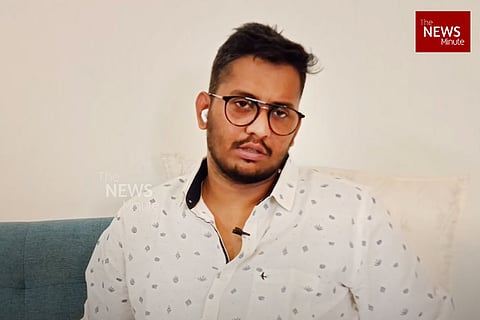

It was in December 2020 that lawyers from the Raman Pillai Associates first approached him to help actor Dileep in the 2017 actor assault case, says Sai Shankar, sitting in his house in Kozhikode. It is the afternoon of April 9, a day after he had unexpectedly appeared before the media, ready to talk. Sai’s name first cropped up in media reports in late March, as the cyber expert who helped destroy data that could have been evidence against Dileep. By then, Dileep, a popular actor in Malayalam cinema, had already become an accused in two cases – the abduction and sexual assault of a fellow actor, and a conspiracy to kill the police officials investigating the former.
“Dileep’s legal counsel had come to me seeking some technical favour. This was in December 2020,” Sai Shankar tells TNM. Sai, too, is one of the accused in the conspiracy case registered against Dileep. He may have helped destroy content that could be evidence in the case, but Sai says he is “100% sure” that he could retrieve all of it. After he surrendered to the cops last week, the court gave a few days’ time – nearly two weeks – for him to record his statements under Section 164 of the Code of Criminal Procedure (CrPC).
Sai had known Raman Pillai for some time, as the advocate had earlier appeared for him in court in connection with another case. So when a team under Raman Pillai – a man he deeply respected – came to him, he agreed to help, Sai says. In the beginning, this ‘favour’ included technical clarifications in matters related to the actor assault case. “For instance, if they had to cross examine forensic experts in court, they would ask me for information that they could eventually use for the purpose of the trial,” he says.
Last year, when it looked like the trial was about to come to a close, director Balachandrakumar appeared before the media, said he was a friend of Dileep and began making new revelations that could prove crucial to the case. He produced a series of audio recordings of private conversations purportedly between Dileep and others, which in turn led to the filing of the conspiracy case against Dileep. This was when Dileep’s counsel met Sai again with a new request.
“They (Dileep and the other accused) were asked to submit their phones in court. So, Dileep’s counsel called me to say that some classified information, which was not connected to the case, had to be removed from the gadgets,” Sai says.
He was given two phones – an iPhone 12 Pro and iPhone 13. Together, the devices had around 38,000 photos, videos and screenshots, he says.
“Dileep had examined each photo and document on the phones. He was clear on what he wanted removed, what was to be retained and what to make a copy of. I made a checklist based on these instructions. They wanted three copies of the data that was being removed in a hard disk and one copy of the data that was to be retained in a pen drive. After the work was done, I returned everything including the devices and the checklist I made. I didn’t keep a copy. But as the phones were connected to my iMac, there would be a mirror copy,” he says.
Watch: TNM's interview with Sai Shankar
He came across many documents that he thought were court related, Sai says. “There were certain names connected to the case, which were very familiar, having come up in the media before. Their secret statements and other details were on the phone. The counsel was very particular about removing that content, because you wouldn’t get those from the court. I don’t know how valuable these documents are, but the police would,” Sai says.
Seeds of doubt began forming in his mind through the course of time, he says. Sai had at first thought Dileep innocent, trapped in a case he had nothing to do with. He began doubting, he says, when ‘certain realisations’ came to him.
“When Dileep and the others were questioned by the police (in the conspiracy case) for three days, I had asked them what was wrong in submitting their phones. The counsel then told me that it was necessary to remove some content from the phones before presenting them to the court. They also said the phones had some chats of Balachandrakumar, but I didn’t find any of those in either of the devices. Some screenshots of earlier chats were sent to these phones from another device,” he says.
Even before all of this, the way they ‘dealt’ with him had made him rethink, go back to their previous conversations and understand what he has been doing. “The realisation of who I am doing all this for – someone who has no connection with me – that’s what made me rethink. My family was going through a lot because of this. And all of that for this person. Who am I to support him and fight against the system and the force? I don’t think I am capable of doing it. I won’t be doing it either,” Sai says, adding that this was what made him surrender.
He is now afraid, he says, as anyone who speaks out dangerous facts will be. “What if I reveal something that might make things difficult for them,” he asks. He has received calls offering what he calls ‘delayed support’, but he doesn’t mention who it is from.
Contradicting certain reports, he says he had never complained of police harassment. He did not know what he was signing on when he was asked to sign a document. The police have been treating him well, despite the fact that he is an accused in the conspiracy case, he says.
In less than two weeks, Sai will be appearing before the court to record his statement before a magistrate under Section 164 of the CrPC.